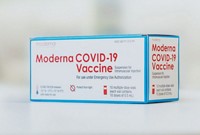Advertisement
Grab your lab coat. Let's get started
Welcome!
Welcome!
Create an account below to get 6 C&EN articles per month, receive newsletters and more - all free.
It seems this is your first time logging in online. Please enter the following information to continue.
As an ACS member you automatically get access to this site. All we need is few more details to create your reading experience.
Not you? Sign in with a different account.
Not you? Sign in with a different account.
ERROR 1
ERROR 1
ERROR 2
ERROR 2
ERROR 2
ERROR 2
ERROR 2
Password and Confirm password must match.
If you have an ACS member number, please enter it here so we can link this account to your membership. (optional)
ERROR 2
ACS values your privacy. By submitting your information, you are gaining access to C&EN and subscribing to our weekly newsletter. We use the information you provide to make your reading experience better, and we will never sell your data to third party members.
Vaccines
GSK’s RSV vaccine first to get FDA nod
A slew of other companies are also targeting the new market
by Shi En Kim
May 4, 2023
| A version of this story appeared in
Volume 101, Issue 15

After years of vaccine drought for respiratory syncytial virus (RSV), we are now on the brink of a deluge. GSK’s vaccine candidate that protects older adults from RSV-related disease received approval from the US Food and Drug Administration May 3. The firm says that it expects vaccine will be available for older adults before the 2023/24 RSV season. The vaccine will be sold under the brand name Arexvy, and is the first approval in a lineup of RSV vaccines racing towards the market.
According to the National Institute of Allergy and Infectious Diseases (NIAID), RSV infections affect over 64 million people worldwide and cause 160 thousand deaths annually. The population most vulnerable to the virus are infants and seniors.
GSK’s vaccines rouse the body’s immunity with an RSV surface protein called the F glycoprotein. Before the virus breaks in and enters the host cell, it exists in a lollipop-shaped prefusion form. Vaccine makers need to safely prime the body to fight proteins in this conformationt. A breakthrough came in 2013 when NIAID researchers discovered a way to freeze the protein in this prefusion state (Science 2013, DOI: 10.1126/science.1243283). This finding also laid the groundwork for the spike protein stabilization in COVID-19 vaccines.
Although GSK is the furthest ahead in the RSV vaccine race, other companies aren’t concerned about being only slightly behind. “It’s a huge unmet medical need,” says Paul Chaplin, Bavarian Nordic’s president and CEO. “It’s a huge commercial opportunity as well.” The RSV market size—its current valuation sits around $1.2 billion and could exceed $4 billion by 2027—is large enough to accommodate multiple developers, Chaplin says.
Hot on GSK’s heels, Pfizer is anticipating an FDA decision for its own adult RSV vaccine by the end of May. Pfizer’s vaccine candidate for older adults also contains the prefusion F glycoprotein. Unlike GSK’s vaccine, Pfizer’s prospect is a bivalent one against the A and B strains of RSV, and does not contain an adjuvant. The company claims the latter feature makes its vaccine candidate more tolerable.
“I remain very optimistic that the Pfizer RSV vaccine has the potential to be the absolute preferred vaccine for older adults,” says Mikael Dolsten, chief scientific officer and president of worldwide research, development, and medical at Pfizer. The company is also testing a vaccine for protecting infants that would be administered to pregnant women, who would then pass their immune protection to their newborns.
“Pfizer and GSK have set a fairly high bar in terms of overall efficacy, but their actual impact on preventing severe disease and hospitalization in the most vulnerable has yet to be proven,” Andrew McConaghie, an analyst at Citeline, writes in an email. “There are also substantial concerns about side effects,” so more data is required to reassure patients and physicians.
Further in the future, Bavarian Nordic’s investigational elderly vaccine candidate consists of a live vaccinia virus decorated with five RSV surface proteins. In theory, this should trigger a broader immune response against RSV compared to a single-protein-based vaccine, Chaplin says. “I think we all have the lesson of viral escape against vaccines with COVID. We don’t want to be in the same situation with RSV.” The company hopes to submit their vaccine for regulatory approval at the turn of the year.
An mRNA vaccine is also in the works. Developed by Moderna, the offering consists of a lipid-ferried mRNA sequence that codes for the prefusion F glycoprotein. In January, the company announced positive phase 3 results for the vaccine among adults 60 years and over. The vaccine is also undergoing pediatric testing.
The arrival of RSV vaccines has been a long time coming, and is the culmination of decades of research, says Steven Varga of St. Jude Children’s Research Hospital. He anticipates that multiple vaccines will gain regulatory approval and eventually make it to the market, just like the myriad COVID-19 vaccines on offer. He also expects that vaccination boosters won’t be required as frequently as one needs against COVID-19 or the flu, because RSV doesn’t mutate as quickly. He also hopes that RSV shots may be able to provide immunity for two years or more, though the clinical data thus far only runs up to one year post-vaccination. “It’s a very exciting time,” he says.




Join the conversation
Contact the reporter
Submit a Letter to the Editor for publication
Engage with us on Twitter